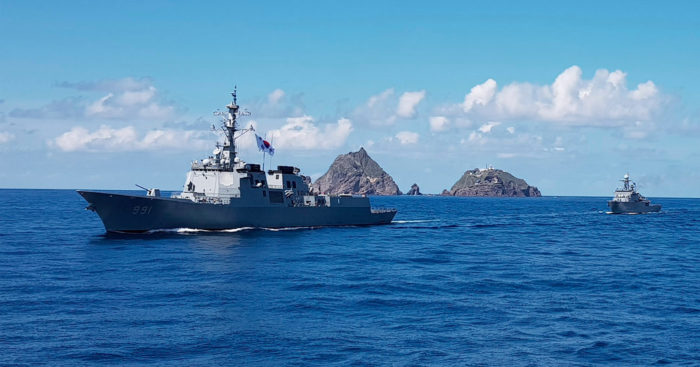
Advertisement
Supported by
South Korean Lawmakers Visit Disputed Islets Claimed by JapanImageSouth Korea conducted a military drill on Aug. 25 near the disputed islands it calls Dokdo. Japan, which also claims them, calls them Takeshima.CreditCreditSouth Korea Navy, via Associated Press
By Choe Sang-Hun
Aug. 31, 2019
SEOUL, South Korea — Six South Korean lawmakers on Saturday visited a group of islets at the center of a territorial dispute with Japan, a symbolic gesture of defiance as the two nations are locked in a bitter diplomatic and trade dispute.
The lawmakers flew by South Korean police helicopter to the largely uninhabitable, volcanic outcroppings, which South Korea calls Dokdo and Japan calls Takeshima. YTN, a South Korean cable news channel whose reporters joined the trip, broadcast scenes from the islands, during which the lawmakers met with police officers stationed there.
Each year, tens of thousands of South Koreans take tourist boats around the islets, which the South controls despite Japan’s competing claim. Many of them land there when weather permits, usually unfurling a national flag and shouting, “Dokdo is our land!”
But visits by South Korean lawmakers are relatively rare. When eight went there last November, they prompted a protest from Japan.
Kenji Kanasugi, an official with Japan’s Ministry of Foreign Affairs, said in a statement on Saturday that the latest visit “cannot be accepted and is extremely regrettable, given that Takeshima is Japan’s inherent territory in light of historical facts and international laws.”
Relations between South Korea and Japan have plummeted since late last year, when the South’s highest court ruled that Japanese companies must pay reparations to South Koreans who were subjected to forced labor during Japan’s colonial rule more than 70 years ago. The dispute escalated sharply when Japan began imposing trade restrictions on South Korea in July.
South Koreans have since been denouncing Japan with protest marches and boycotts of its goods. Recently, South Korea announced that it would terminate a military intelligence-sharing deal with Japan, alarming Washington, which had brokered the arrangement to improve security cooperation between its two major allies in the region.
Visits to the disputed islands by ordinary South Koreans, as well as politicians, tend to spike during periods of tension with Japan. South Koreans see Japan’s claim to the islands as emblematic of its past aggression and what they consider its refusal to atone for its occupation of Korea.
Nearly 172,500 South Koreans took ferry trips to the islands in the first seven months of this year, up nearly 30 percent from the same period last year, according to government data. Last Sunday, South Korea conducted a large military drill around the islands, deploying some of its most powerful warships and jets, as well as army and navy commandos.
South Korea has kept an armed police contingent on the islands, which are surrounded by rich fishing grounds, since the 1950s.
Motoko Rich contributed reporting from Tokyo.
Advertisement
